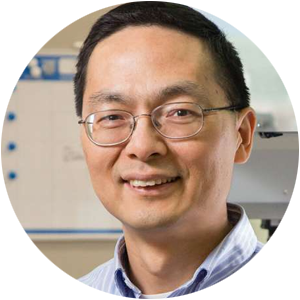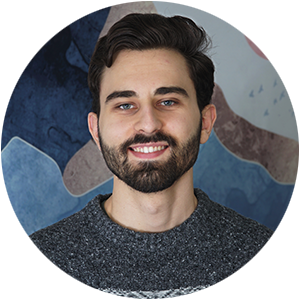
The iBioFAB aims to accelerate the biological engineering process by integrating artificial intelligence/machine learning with automation. This synthetic biology foundry features a 6-degree-freedom articulated robotic arm that travels along a 5-meter-long track to transfer microplates among more than 20 instruments installed on the platform.
The system houses three liquid handling devices: the nanoliter-scale Labcyte Echo 550 acoustic liquid handler in addition to the pipet-based Tecan Freedom EVO 200 and Tecan Fluent 1080 systems. The iBioFAB Tecan Fluent is equipped as a workhorse for most cell-culture related tasks, containing a SciRobotics Pickolo colony picker and PetriPlater spiral plater in addition to a vacuum-based solid phase extraction platform and an array of Peltier blocks and bioshakers. For sample analysis, the iBioFAB includes a BioTek Cytation 5 automated microscope, a Tecan Infinite M1000 plate reader, and an Agilent Fragment Analyzer Infinity. To enable unattended automated operation, the iBioFAB also contains instruments for automating standard laboratory tasks: An Agilent Microplate Centrifuge, Agilent Microplate Barcode Labeler, four Thermo-Fisher Multidrop Combi reagent dispensers, four Biometra TRobot thermal cyclers, a Thermo-Fisher ALPS 3000 automated microplate heat sealer, a Brooks Life Sciences XPeel plate seal remover, as well as multiple plate shaker and Peltier block arrays.
At maximum capacity, this biofoundry can house over 500 96-well plates within its four Thermo-Fisher Cytomat automated incubators. Coupled with an integrated laboratory information management system (LIMS) and scheduling software, the iBioFAB can generate thousands of output samples each day using custom-designed workflows for plasmid assembly, microbial transformations, and more.
- Services
-

Synthesis of TALENs
Fully automated synthesis of TALEN libraries. (Chao et al., 2017)
(a) General workflow for the DNA assembly pipeline based on the Golden Gate method. Script Generator converted project design ideas, such as permutations of DNA parts, to assembly designs with appropriate extensions and further robotic commands for pipetting the stock plasmids to DNA mixes. In Golden Gate reactions, Type IIs restriction enzymes such as BsaI generated a set of standard precharacterized 4-bp single strained ends as linkers. The corresponding linkers annealed and were ligated by T4 ligase. (b) Process flow diagram for the build step. Unit operations employed were marked in blue.
High-throughput yeast strain engineering
Automated yeast strain engineering using iBioFAB (Si et al., 2017)
(a) Hardware layout of iBioFAB. (b) Process modules and unit operations in the workflow of yeast engineering. Any subset of all the unit operations enabled by iBioFAB can be programmed in custom-designed sequences to perform necessary process modules for creating and screening strain libraries in an iterative and automated manner. (c) Process flow diagram. Unit operations used in the yeast engineering workflow are marked in blue in b,c. - Publications
-
Towards a fully automated algorithm driven platform for biosystems design
2019
HamediRad, M., Chao, R., Weisberg, S., Lian, J., Sinha, S., & Zhao, H. (2019). Nature Communications, 10:5150.
Building a Global Alliance of Biofoundries
2019
Hillson, M. Caddick, …, H. Zhao, P.S. Freemont. (2019). Nature Communications, 10:2040.
Biosystems design by directed evolution
2019
Wang, Y., Yu, X., & Zhao, H. (2019). AIChE Journal. 66, e16716.
Automated multiplex genome-scale engineering in yeast
2017
Si, T., Chao, R., Min, Y., Wu, Y., Ren, W., & Zhao, H. (2017). Nature Communications, 8, 15187.
Fully automated one-step synthesis of single-transcript TALEN pairs using a biological foundry
2017
Chao, R., Liang, J., Tasan, I., Si, T., Ju, L., & Zhao, H. (2017). ACS Synthetic Biology, 6(4), 678-685.
Engineering biological systems using automated biofoundries
2017
Chao, R., Mishra, S., Si, T., & Zhao, H. (2017). Metabolic Engineering, 42, 98-108.
FairyTALE: a high-throughput TAL effector synthesis platform
2013
Liang, J., Chao, R., Abil, Z., Bao, Z., & Zhao, H. (2013). ACS Synthetic Biology, 3(2), 67-73.



